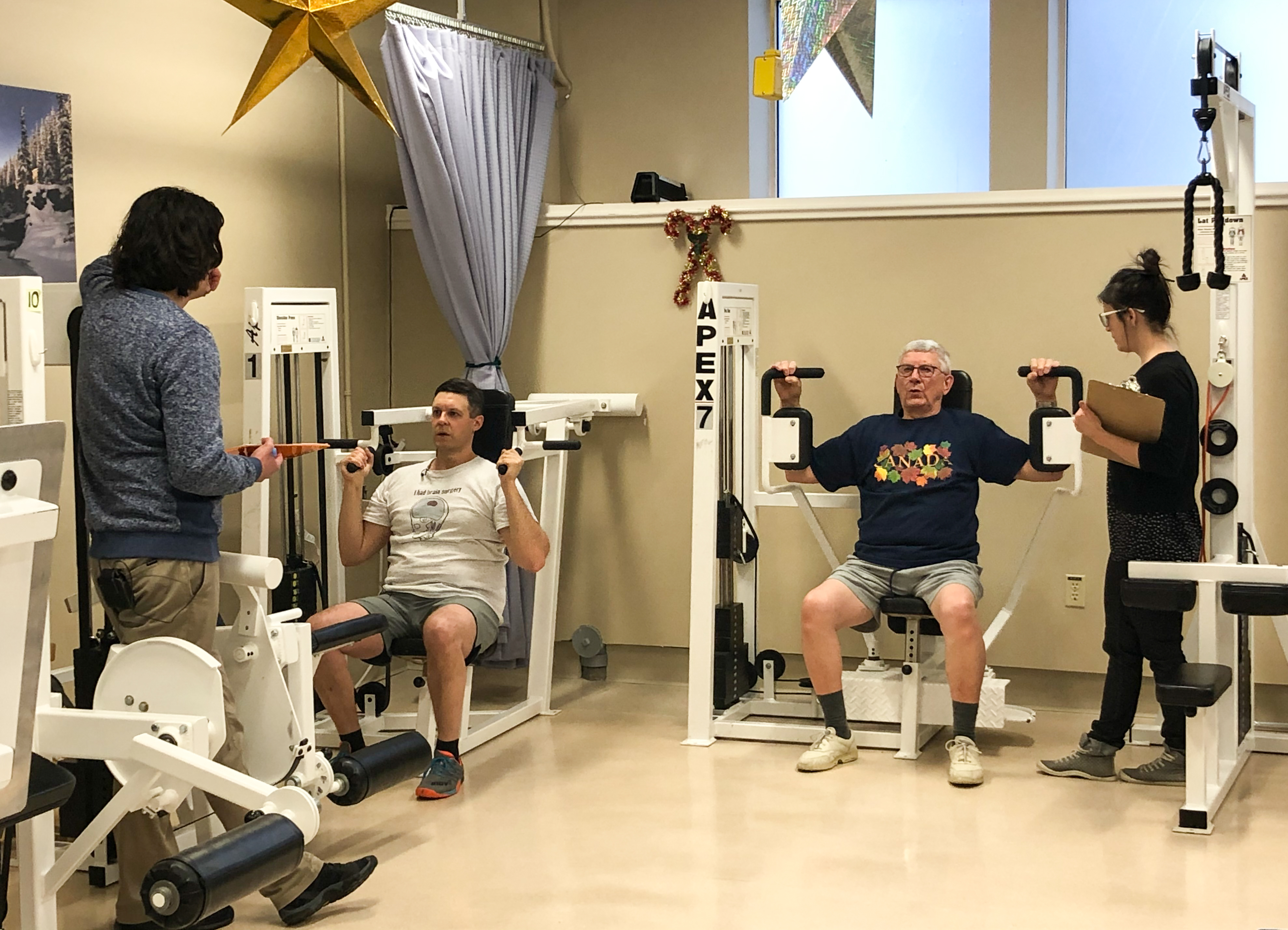
James Leskiw (middle left) and his father Terry (middle right) work out together at the Cancer Rehabilitation Clinic in the Faculty of Rehabilitation Medicine. Both fighting cancer, the Leskiw's are wrapping up their participation in the Alberta Cancer Exercise program study led by Margie McNeely, professor in the Department of Physical Therapy. Chris Sellar, Alberta Cancer Exercise (ACE) project coordinator (left) and Elaine Gobeil, Cancer Rehabilitation Clinic coordinator (right) provide guidance and support.
Alongside his dad Terry, who is a cancer survivor himself, James has been participating in the Alberta Cancer Exercise (ACE) program at the University of Alberta's Faculty of Rehabilitation Medicine. He was diagnosed with a brain tumor last year, has finished radiation plus chemotherapy and is finishing up another round of chemotherapy treatments.
"James is the love of my life, we're hunters, fishermen, we do a lot together," said Terry, 73. "At first I was just driving James and waiting for him, but when Margie McNeely found out I'd had prostate cancer, I got into the program as well. When you have something like this happen, you realize the little things in life are important, and the little things that we do as a family together."
"I think it's really cool to do this with my dad," said James, 42.

James completes exercises in the
Cancer Rehabilitation Clinic as part
of the ACE program.
"Research shows that exercise has many benefits for cancer patients and survivors, at any stage of their treatment and recovery. The goal of the ACE program is to support cancer patients and survivors to take part in exercise in a setting that feels comfortable and welcoming," said Margie McNeely, ACE study lead and director of the Cancer Rehabilitation Clinic.
Some of the participants in ACE are in remission, some are just starting treatment and some of the participants have advanced cancer and may be on and off cancer treatments to control their disease.
"Many of these individuals will live a long time with cancer. For these patients and survivors, their needs in terms of rehabilitation are ongoing and we want to support them in maintaining the best possible quality of life," said McNeely, who is also a professor in the Department of Physical Therapy.
The ACE program is tailored to each participant's fitness level and designed to address personal fitness or lifestyle goals. Many of the participants experience benefits from taking part in the program including having more energy, improved strength and physical fitness, and better overall health and wellness. McNeely's ACE team is now working with some of the cancer groups to tailor the program to specifically meet their needs, providing a more customized approach.

James and Terry have a friendly competition
to see who can hold a plank the longest at
the Cancer Rehabilitation Clinic.
"I started in July, and since then I've gone through chemo and the side effects have been negligible. The worst thing I get is fatigued, but the recovery from that has really improved. When the fatigue hits I have to nap around three hours, but then as I come off the chemo cycle, the recovery is so much quicker, I don't have to nap, or the nap is 20 minutes," said James.
"It's hard to put numbers on that, but I attribute it to the activity, and I also have an overall feeling of well-being now which is amazing."
"I'm just sold on this whole thing. It's the little things they do; they can adjust my program so that it makes me feel better. They all have their expertise. And they're a chatty group that boost your morale!" said Terry.
The ACE study is not a funded program, so their next step is to determine how best to implement the program as part of care, and ensure that all Albertans with cancer, regardless of location of residence, have access to, and can benefit from, supported exercise.